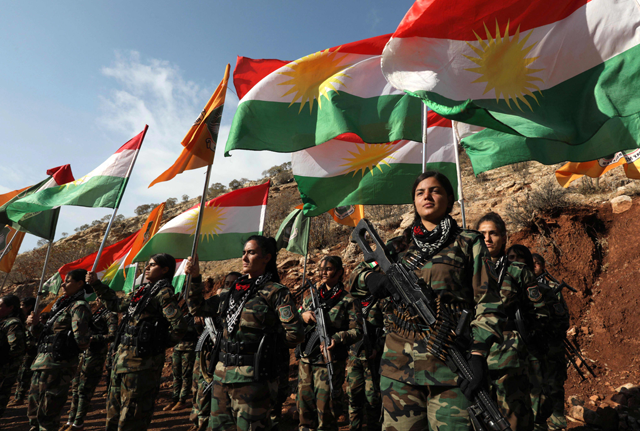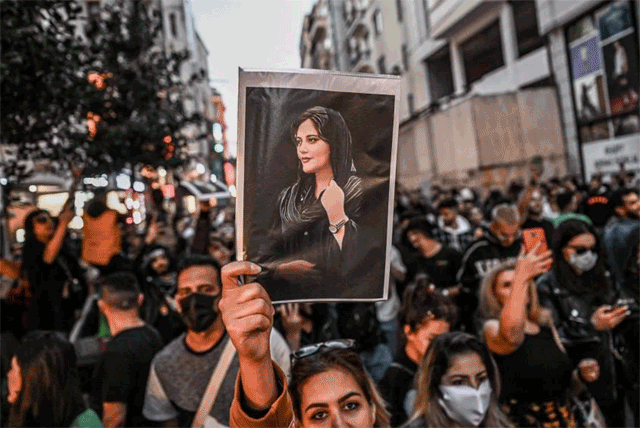You are here
Iran activists brush off claim morality police abolished
By AFP - Dec 06,2022 - Last updated at Dec 06,2022

Female Kurdish Peshmerga fighters affiliated with Iran's separatist Kurdistan Freedom Party, are pictured at a base in an undisclosed location in the Erbil province, the capital of the autonomous Kurdish region of northern Iraq, on December (AFP photo)
PARIS — Campaigners backing Iran's protest movement on Monday dismissed a claim that the Islamic republic is disbanding its notorious morality police, insisting there was no change to its restrictive dress rules for women.
There were also calls on social media for a three-day strike, more than two months into the wave of civil unrest sparked by the death of Kurdish-Iranian woman Mahsa Amini, 22, after her arrest by the morality police in Tehran.
Amini was accused of flouting Iran's strict dress code demanding women wear modest clothing and the hijab headscarf, and her death sparked protests that have spiralled into the biggest challenge to the regime since the 1979 Islamic revolution.
Iran's Prosecutor General Mohammad Jafar Montazeri, in a surprise move at the weekend, was quoted as saying that the morality police units, known as gasht-e ershad (guidance patrol), had been closed down.
But activists were sceptical about his comments, which appeared to be an impromptu response to a question at a conference rather than a clearly signposted announcement on the morality police, which is run by the interior ministry.
Moreover, they said, their abolition would mark no change to Iran's headscarf policy, a key ideological pillar for its clerical leadership, but rather a switch in tactics on enforcing it.
Scrapping the units would be "probably too little too late" for the protesters who now demand outright regime change, Roya Boroumand, co-founder of the US-based Abdorrahman Boroumand Center rights group, told AFP.
"Unless they remove all legal restrictions on women's dress and the laws controlling citizens' private lives, this is just a PR move," she said, adding that "nothing prevents other law enforcement" bodies from policing "the discriminatory laws".
'Civil disobedience'
The guidance patrols have been a familiar sight on Tehran's streets since 2006 when they were introduced during the presidency of the ultra-conservative Mahmoud Ahmadinejad. But the clerical leadership had been strictly enforcing the rules, including the headscarf, well before then.
Under the last shah, Mohammad Reza Pahlavi, women had been free to dress as they wished with fashions little different from Western countries in secular areas of Tehran. His father Reza Shah had gone a step further in an edict issued in 1936, seeking to ban all Islamic veils and headscarves.
It was anger over the obligatory headscarf rule that sparked the first protests over the death of Amini, who died from what her family says was a blow to a head sustained in custody. The authorities dispute this.
But the movement, fed also by years of anger over economic grievances and political repression, is now marked by calls for an end to the Islamic republic led by Ayatollah Ali Khamenei.
Reports from Tehran have suggested the feared vans of the guidance patrols had already become much less common or even vanished after the protests broke out.
Images have also shown women smashing decades-long taboos by attending protests or even carrying out daily tasks like going shopping without headscarves.
The authorities have meanwhile been concentrating on battling the protests themselves in a crackdown that has left at least 448 people dead, according to Norway-based group Iran Human Rights.
"The alleged suspension of Iran's morality police doesn't mean anything as it had already become irrelevant due to the massive level of women's civil disobedience and defying hijab-related rules," said Omid Memarian, a senior Iran analyst at Democracy for the Arab World Now.
He described the mandatory headscarf as "one of the pillars of the Islamic republic" and said that "abolishing those laws and structures would mean a fundamental change in the Islamic Republic's identity and existence".
Montazeri's declaration and the confusion the comments sparked were seen as a sign of the disquiet within the regime over how to handle the protests which are continuing across the country despite the crackdown.
Within Iran on Monday there appeared to be hesitancy over the meaning of the comments with only reformist dailies putting the issue on their front page and conservative media largely ignoring it.
"The end of the morality police," read a headline in daily Sazandegi. But the Sharq newspaper was more circumspect. "Is this the end of the patrols?" it asked, noting the police public relations had not confirmed it.
"We should not be fooled by deceptive moves the Islamic Republic employs at times of desperation, as they might come back with other restrictive policies and measures," said Memarian.
The hijab is "still compulsory", said Shadi Sadr, co-founder of the London based group Justice for Iran. While the protests started over the death of Amini, he predicted, "Iranians won't rest until the regime is gone."
Related Articles
TEHRAN — Iran has scrapped its morality police after more than two months of protests triggered by the death of Mahsa Amini following her ar
TEHRAN — Iran has sentenced to death five people over the killing of a Basij paramilitary force member during nationwide protests sparked by
PARIS — One month ago, a 22-year-old woman was pronounced dead after she had been detained by Iran’s notorious morality police for alleged v















